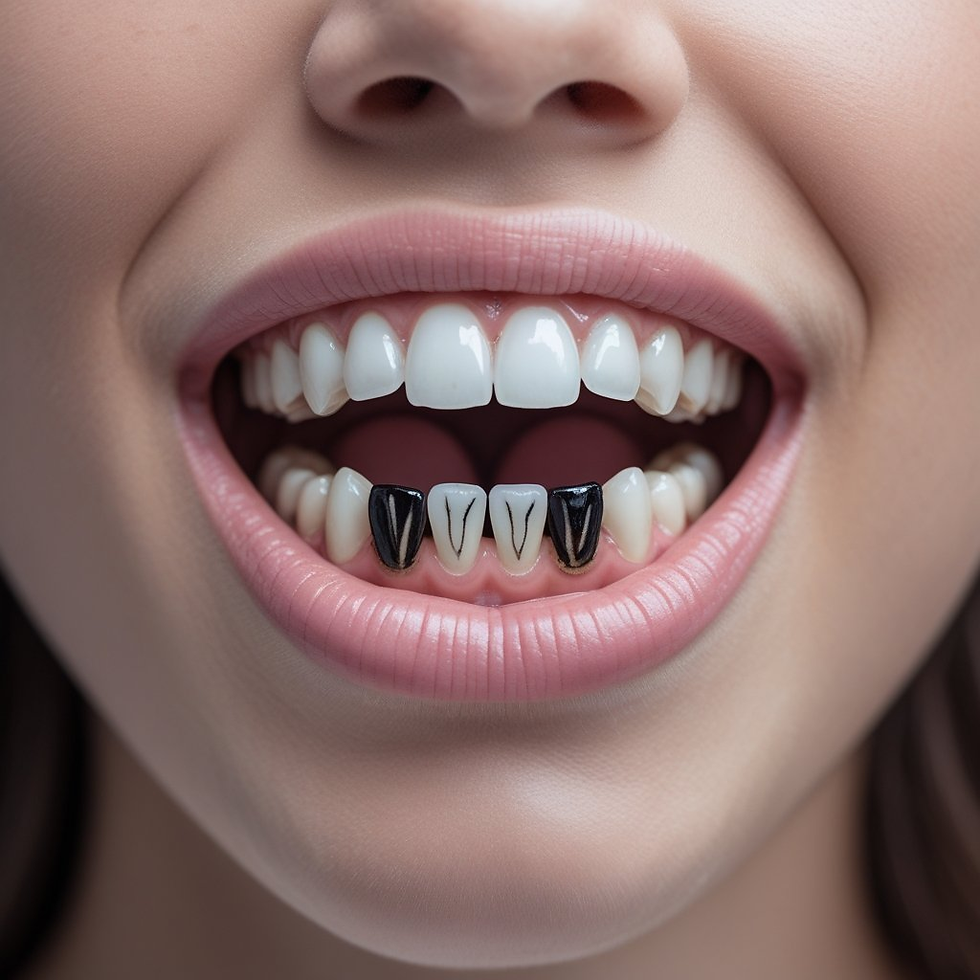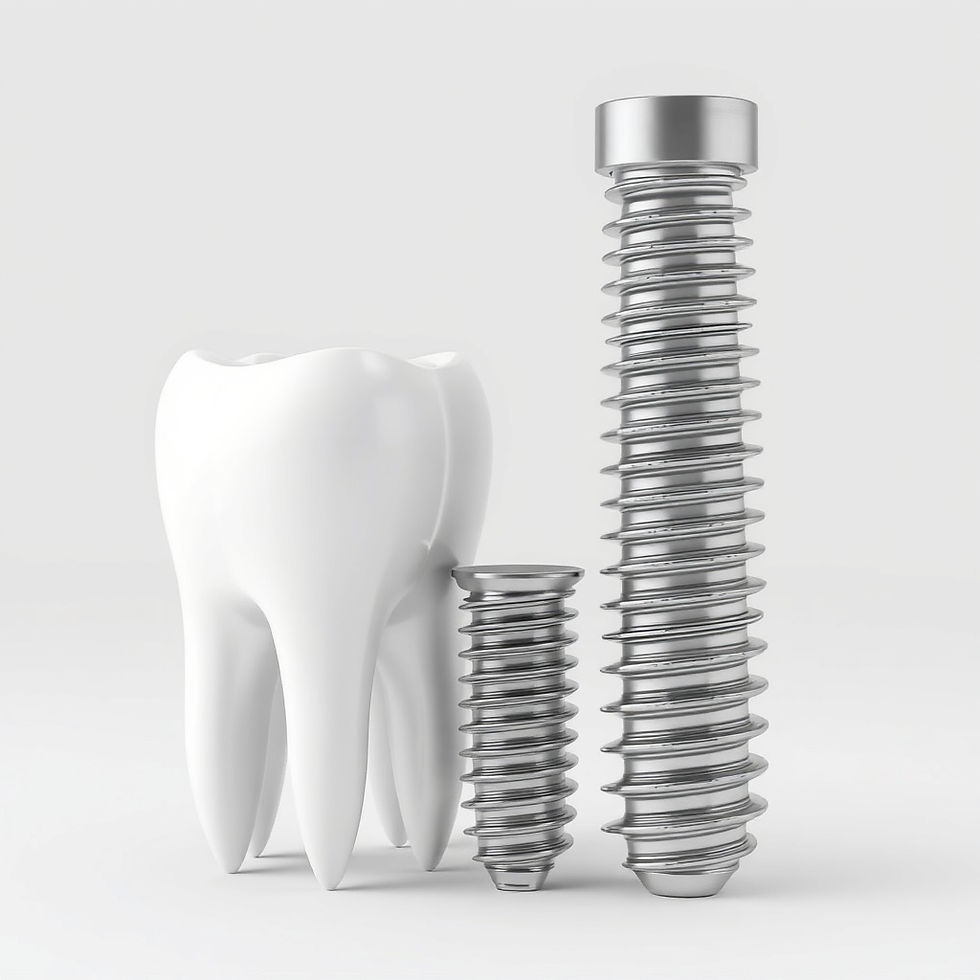Black Lines on Teeth
- plurefy com
- Aug 18, 2025
- 3 min read

Have you noticed thin black lines or dark stains forming near your gums or along the edges of your teeth? These marks can be concerning, especially if they don’t disappear with regular brushing. While black lines on teeth are often harmless stains, sometimes they signal underlying dental issues.
In this guide, we’ll explore what black lines on teeth mean, why they appear, how to treat them, and the best prevention tips for keeping your smile bright.
What Are Black Lines on Teeth?
Black lines on teeth are dark streaks or discolorations that typically form along the gumline or between teeth. They may appear as:
Thin, sharp lines at the base of teeth
Small black dots or patches
Dark stains spreading on enamel
While some are caused by surface stains, others may point to tooth decay, tartar buildup, or cavities. Identifying the cause is essential for proper treatment.
Causes of Black Lines on Teeth
Several factors can lead to dark streaks or lines on teeth. Let’s look at the most common:
1. Tartar (Calculus) Buildup
Plaque that hardens into tartar can appear dark brown or black.
It usually builds near the gums, creating a thin line.
Tartar cannot be removed with brushing alone — only a dentist can clean it.
2. Tooth Decay or Cavities
When enamel erodes, cavities form and may appear black.
Cavities often begin as small spots but can grow larger if untreated.
3. Staining from Food & Drinks
Coffee, tea, wine, and dark-colored foods can leave stubborn stains.
Smoking and tobacco use also cause deep discoloration.
4. Iron Supplements
Liquid iron supplements are known to cause black stains on teeth.
5. Dental Restorations
Metal fillings or crowns can sometimes leak or corrode, leaving black marks.
6. Oral Hygiene Issues
Inconsistent brushing and flossing increase plaque buildup, which eventually darkens.
Are Black Lines on Teeth Dangerous?
Not always — but they should not be ignored.
If caused by staining, they’re mostly cosmetic.
If linked to tooth decay or gum disease, they could lead to pain, infection, or tooth loss.
Visiting a dentist helps determine whether it’s harmless staining or a sign of dental problems.
Treatment Options for Black Lines on Teeth
The right treatment depends on the cause. Common solutions include:
1. Professional Dental Cleaning
Removes tartar and plaque buildup.
Polishing eliminates surface stains.
2. Teeth Whitening
In-office bleaching or at-home whitening kits can help.
Works best for stain-related black lines.
3. Fillings or Restorations
If cavities cause black marks, dentists may use fillings, inlays, or crowns.
4. Veneers or Bonding
For severe discoloration, cosmetic procedures like veneers can restore appearance.
5. Good Oral Care Routine
Daily brushing, flossing, and mouthwash use prevent recurrence.
Prevention Tips
Stopping black lines before they form is easier than fixing them later. Follow these steps:
Brush twice daily with fluoride toothpaste.
Floss daily to remove plaque between teeth.
Limit dark foods & drinks like coffee, tea, and soda.
Quit smoking or chewing tobacco.
Rinse after meals with water or mouthwash.
Visit the dentist every 6 months for cleanings and check-ups.
When to See a Dentist
You should book a dental appointment if you notice:
Black lines that don’t fade after brushing.
Pain, swelling, or bleeding gums.
Bad breath or tooth sensitivity.
Expanding dark patches on teeth.
Early treatment prevents small stains from turning into major dental issues.
FAQs About Black Lines on Teeth
1. Can black lines on teeth go away with brushing?
Surface stains may fade, but tartar or decay won’t. You’ll need professional cleaning.
2. Do black lines mean cavities?
Not always. They could be stains, but if the line is deep, it may indicate decay.
3. Can children get black lines on teeth?
Yes. Poor brushing habits or iron supplements often cause it in kids.
4. What is the fastest way to remove black lines on teeth?
A professional dental cleaning is the quickest and safest method.
5. Are home remedies effective?
Whitening toothpaste and baking soda may help mild stains, but not tartar or cavities.
Conclusion
Black lines on teeth can make your smile look dull and raise dental health concerns. While some are simple stains, others may signal cavities or gum disease. The best approach is to maintain strong oral hygiene, reduce stain-causing habits, and visit your dentist regularly.
A healthy smile starts with prevention — and if black lines appear, timely treatment ensures your teeth remain strong, clean, and confident.










Comments